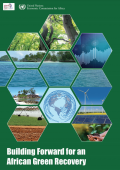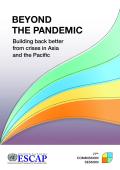This report presents economic prospects for developing Asia and the Pacific. It includes analysis of the impacts of school closures caused by the pandemic and a theme chapter on financing a green and inclusive recovery.
G7 Leadership for Sustainable, Resilient and Inclusive Economic Recovery and Growth - Summary Report
The report first sets out the challenges and opportunities facing the world in building back better, followed by the shared vision and strategy, and concludes with priorities for action.
This report by C40 Cities analysed and modelled what could happen if Canada's major cities collectively prioritised a green and just recovery consistent with limiting global heating to less than 1.5 degrees Celsius. A recovery based on the principles of a Global Green New Deal would see COVID-19 stimulus funds channelled to expenditure in key areas, such as building retrofits, mass transit, walking and cycling infrastructure and clean energy.

A swift and bold response is needed to address the devastating impact of the climate, health and economic crises. African finance ministers have called for an injection of external assistance of $100 billion each year for the next three years to close the financing gap of more than $345 billion identified by the IMF. Finally, for climate, health, and the economy, one thing is clear: the entire international community must cooperate to reset and rebuild a stronger multilateral framework to respond to global crises and provide equitable, just and transparent processes and systems for the management and implementation of rapid, monitorable solutions.

This study analyses the socio-economic impacts of the pandemic in countries of Asia and the Pacific, takes stock of action so far, and sets out a policy agenda for building back better grounded in regional cooperation and centered around four critical interconnected areas: broadening social protection, investing in a sustained recovery, strengthening connectivity and supply chains; and mending a broken relationship with nature.
